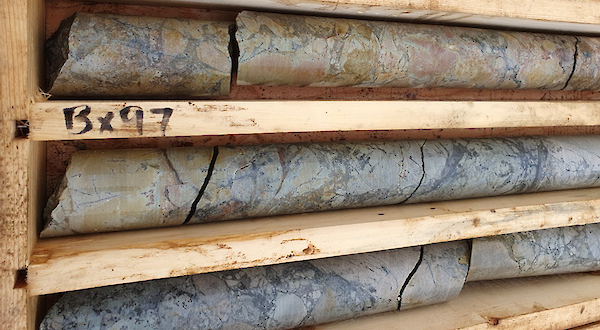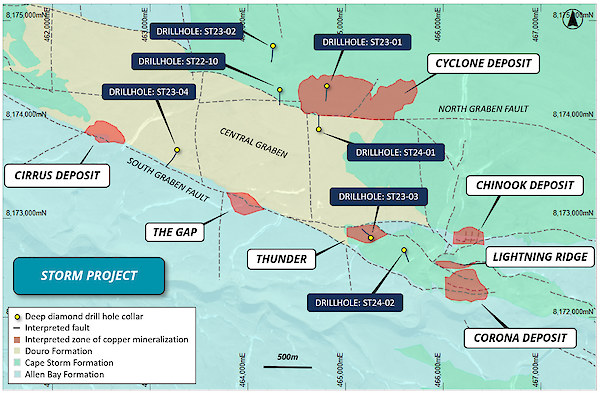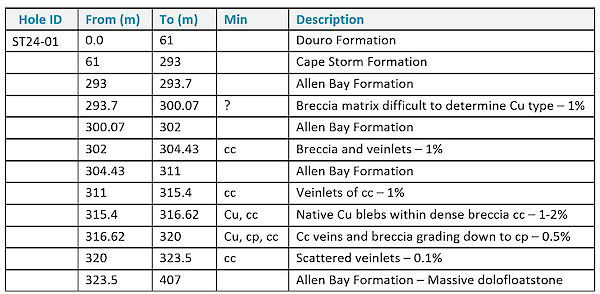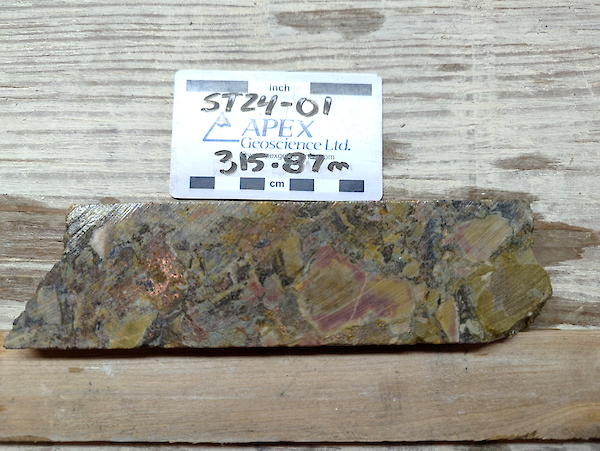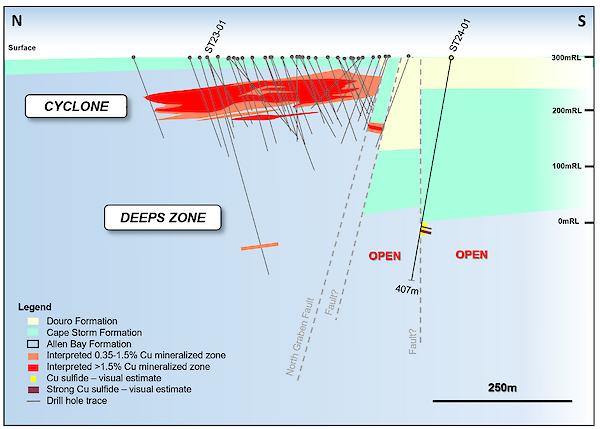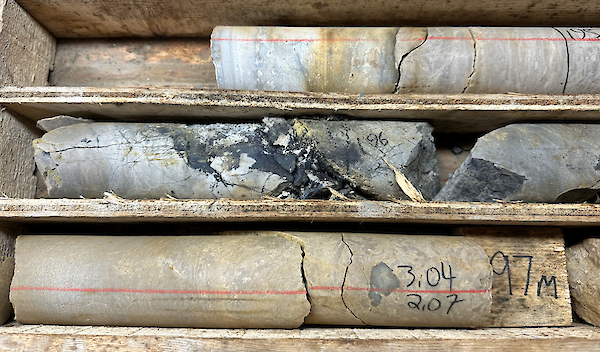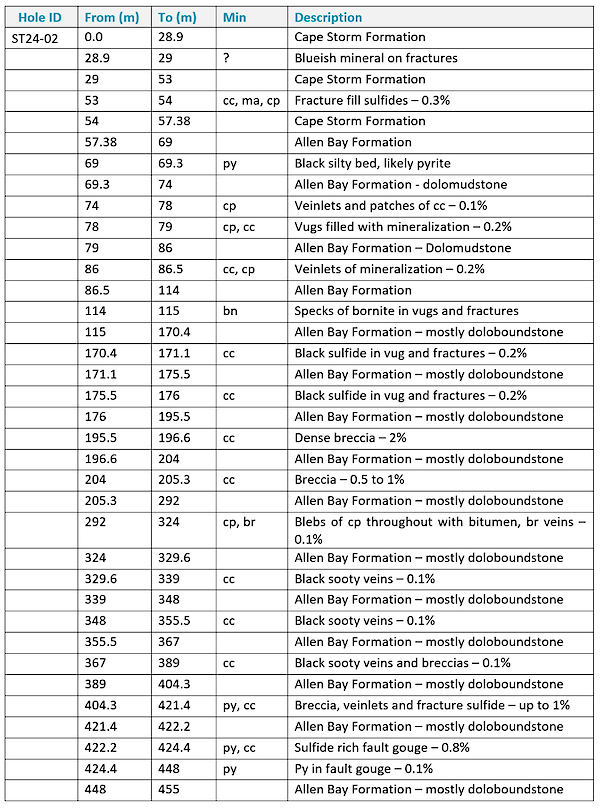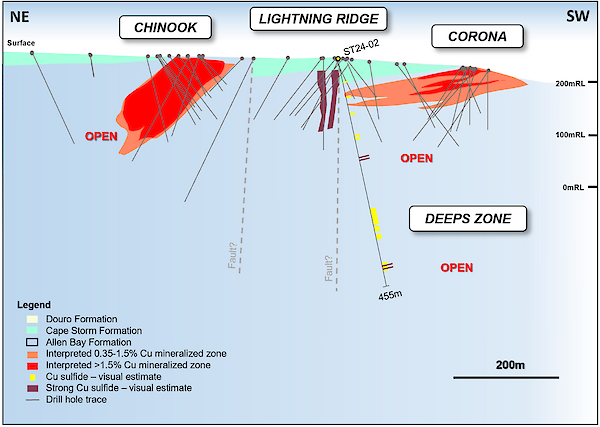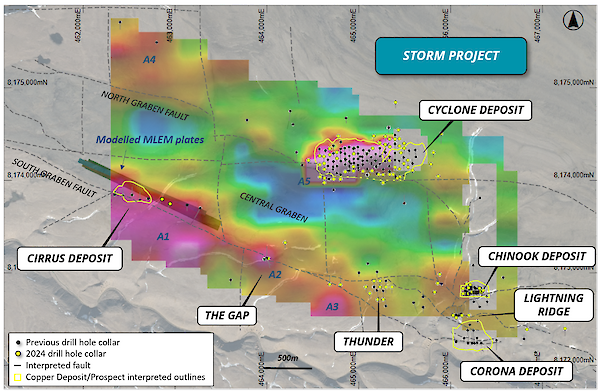News
Large-Scale Copper Targets at Depth Take Shape at the Storm Project, Nunavut, Canada
Diamond drilling intersects new zones of copper at depth as the deep search EM survey identifies a 1,300m x 500m anomaly for drill testing
HIGHLIGHTS
- 100% hit rate continues for the deep diamond drilling with thick intervals of visual copper mineralization intersected at depth below the known near-surface copper deposits
- The drilling confirms the large lateral extent of the Storm copper system at depth – now intersected over 10 square kilometres – and highlights the potential of Storm to host large-scale stratigraphic and structurally hosted high-grade copper deposits similar to those in the Central African Copperbelt
- Drill hole ST24-01 has intersected a combined total of 21.3 metres (“m”) of visual copper mineralization, which includes:
- 6.37m of visual copper sulfide from 293.7m downhole, and
- 2.43m of abundant visual copper sulfide from 302m downhole
- 12.5m of visual copper sulfide from 311m downhole, including
- 4.6m of abundant visual native copper and copper sulfides from 315.4m downhole
- Drill hole ST24-02 has intersected a combined total of 99.2m of visual copper sulfide, which includes highlights:
- 1.1m of abundant visual copper sulfide from 195.5m downhole, and
- 1.3m of abundant visual copper sulfide from 204m downhole, and
- 17.1m of moderate to abundant visual copper sulfide from 404.3m downhole
- The deep search phase of the Moving Loop Electromagnetic (MLEM) survey has defined a 1,300m x 500m anomaly at depth below the Cirrus Deposit and The Gap Prospect, with target drilling now underway
Visual estimates of mineral abundance should never be considered a proxy or substitute for laboratory analyses where concentrations or grades are the factor of principal economic interest. Laboratory assays are required to determine the presence and grade of any contained mineralization within the reported visual intersections of copper sulfides. Portable XRF is used as an aid in the determination of mineral type and abundance during the geological logging process.
TORONTO, Ontario, August 22, 2024 – Aston Bay Holdings Ltd. (TSXV: BAY) (OTCQB: ATBHF) ("Aston Bay" or the "Company”) is pleased to provide an update on drilling activities at the Storm Copper Project (“Storm” or the “Project”) on Somerset Island, Nunavut. The exploration program is being conducted by American West Metals Limited (“American West”), who is the operator of the Project. Aston Bay and American West have formed a 20/80 unincorporated joint venture in respect of the Storm Project property, with Aston Bay maintaining a free carried interest until a decision to mine upon completion of a bankable feasibility study.
Thomas Ullrich, Chief Executive Officer of Aston Bay, commented:
“The first two deep diamond drill holes of this season have hit an impressive amount of visual copper mineralization of the same style as we see in the high-grade near-surface deposits. When added to the five deep holes drilled over the 2022 and 2023 seasons in a 10 square kilometre area, all of which hit copper and associated sulfide mineralization at depth, the “Storm Deeps” drilling is developing into a compelling exploration story.
“The two new holes were drilled on structural and stratigraphic targets before the completion of the new deep-looking geophysical surveys that have yielded large, strong anomalies at the same stratigraphic level as the copper intercepts in the deep holes. These electromagnetic surveys have proven very successful in targeting copper mineralization at Storm, and I expect the upcoming deep holes, including one currently underway, will benefit from improved targeting of potentially higher-grade and larger zones of copper mineralization. I am eager to see what the drill rig reveals in the coming weeks.”
Figure 1: Drill core from ST24-01 from approximately 315.4 – 318m downhole. Dense veins and breccia of visible chalcocite (copper sulfide) can be seen as dark sooty grey, within light grey/tawny dolomite host rocks. This interval also contains blebs of native copper (metallic mineral, top right).
DEEP COPPER SYSTEM EXPANDING
Diamond drill holes ST24-01 and ST24-02 have been completed at the Storm Project with both drill holes building on the success of prior deep drilling programs by intersecting thick intervals of visual copper mineralization containing thinner subintervals of very abundant visual copper.
The drill holes were designed to test key geological targets at Storm and the potential for new zones of copper mineralization within the ‘Deep Copper Horizon’ that was discovered during 2023 (see September 26, 2023, Aston Bay News release). Drill hole ST23-02 contained abundant mineralization in a number of narrow bands with grades up to 2.7% Cu at 356.5m downhole, confirming the presence of high-grade copper sulfides at the deeper stratigraphic levels for the first time. This significant discovery pointed to the potential for this deeper stratigraphic horizon to host potentially economic copper mineralization. This concept is further strengthened by the intersection of copper at the same interpreted horizon in every subsequent deep drill hole.
The 2024 drill holes were completed within the Central Graben area, and to the south of the Southern Graben Fault, below the Thunder Prospect, and the Chinook and Corona Deposits.
Figure 2: Plan view of the Storm area showing the geological interpretation, known copper deposit outlines, major faults, and deep diamond drill hole locations.
The drill holes have intersected 21.3m and 99.2m of visual copper sulfides (respectively) within what is interpreted to be the equivalent of the same mineralized stratigraphic horizon as the prior deep drilling. The discovery of copper mineralization in these new locations highlights the potentially laterally extensive nature of the deep copper system, which now covers an area of over 10km2. The reader is reminded that the intervals are variably mineralized and that lateral continuity of the mineralization in these very widely-spaced drill holes has not yet been demonstrated.
The 400m x 400m loop MLEM survey has also now been completed in the Storm area. The survey has identified several high-priority anomalies including a large, late-time anomaly located beneath the Cirrus Deposit and The Gap Prospect. The anomaly has the known extents of 1,300m x 500m and is strongest along the Southern Graben Fault. The third 2024 deep diamond drill hole is currently drilling this MLEM target. The deep search EM is now surveying the Tornado and Blizzard Prospects.
DRILL HOLE ST24-01 DETAILS
ST24-01 was drilled to a downhole depth of 407m and intersected a single main zone of visual copper mineralization (Table 1). The drill hole was designed to test the geology and structure within the Central Graben and was located to the south of the Cyclone Deposit (Figure 2).
The mineralized zone encountered within ST24-01 was intersected between 293.7m and 323.5m downhole and contains a total of 21.3m of visual copper mineralization within three sub-intervals (Table 1).
The visual copper mineralization consists of veinlets and matrix breccias with copper sulfide fillings and cement (Figure 3). Large blebs of native copper are present within the visually strongest mineralized interval between 302m and 304.43m downhole.
The visual copper mineralization is hosted within a thick sequence of fractured dolomudstone of the Allen Bay Formation, the main host of the copper mineralization within the Storm area. The highly fractured and brecciated nature of the mineralized zone suggests that the drill hole may have intersected a mineralized portion of the interpreted Northern Graben Fault.
The mineralization and stratigraphy within ST24-01 are visually very similar to that encountered within previous deep exploration drill holes at Storm, highlighting the potentially laterally extensive nature of the prospective copper horizon. ST24-01 also confirms the prospectivity of the Central Graben where recent shallow Reverse Circulation (RC) drill hole SR24-09 intercepted 15.2m @ 1.4% Cu from 103.6m downhole, in what is interpreted to be a down-dropped zone of mineralization similar to the near-surface Cyclone Deposit (see August 15, 2024, Aston Bay news release).
Now confirmed to host both shallow and deeper mineralization, the large and relatively unexplored Central Graben will be a key target for follow-up drilling.
Visual estimates of mineral abundance should never be considered a proxy or substitute for laboratory analyses where concentrations or grades are the factor of principal economic interest. Laboratory assays are required to determine the presence and grade of any contained mineralization within the reported visual intersections of copper sulfides. Portable XRF is used as an aid in the determination of mineral type and abundance during the geological logging process.
Table 1: Summary geological log for drill hole ST24-01. Mineralization key: cc = chalcocite, cp = chalcopyrite, br = bornite, py = pyrite, Cu = native copper, ct = cuprite, ml = malachite, sph = sphalerite, ga = galena. (5%) = visual estimation of sulfide content.
Figure 3: Chalcocite (dark grey) breccia and native copper (metallic) blebs within fractured dolomite in drill hole ST24-01 from approximately 315.87m downhole.
Figure 4: Schematic geological section at 464730E showing the Cyclone Deposit outline, mineralized intervals in existing drilling outside of the resource, and visual copper sulfide estimates for ST24-01.
DRILL HOLE ST24-02 DETAILS
Drill hole ST24-02 was drilled to a downhole depth of 455m and intersected a total of 99.1m of visual copper sulfide mineralization within two main stratigraphic horizons (Table 2). The drill hole was designed to test the stratigraphy and structure in the southern areas of Storm, south of the Southern Graben Fault.
The upper zone of visual copper mineralization is hosted within the Cape Storm Formation at approximately the same depth as the known near-surface copper deposits at Storm (Figure 6). The Cape Storm Formation is not typically mineralized, but here contains multiple sub-horizons from the surface that are weakly mineralized with intermittent and patchy veinlets of visible chalcocite and chalcopyrite to approximately 54m downhole.
Below this, and to the end of the hole, the drill hole intersected the Allen Bay Formation, the typical host of copper mineralization at Storm.
The entire Allen Bay Formation dolomite within ST24-02 is variably fractured and contains visual copper sulfides hosted within the more fractured layers. Twelve separate visibly mineralized zones have been logged, with the strongest visual copper sulfides located between 195.5m and 196.6m (Figure 5), and 204m and 205.3m downhole respectively.
Chalcocite is the dominant copper sulfide mineral, with minor chalcopyrite and bornite present in veinlets and patchy blebs locally filling vugs along with bitumen (Figure 5).
The large volume of visual mineralization within ST24-02 highlights the potential scale of the copper system at Storm. The proximity of drill hole ST24-02 to the Thunder Prospect, and Chinook and Corona deposits provides further evidence that the Allen Bay Formation within the Southern Graben may host high-grade, stratigraphic- and structurally-hosted copper deposits similar to those of the Central African Copperbelt.
Figure 5: Chalcocite (dark grey) fracture fill in drill hole ST24-02 from approximately 196m downhole.
Visual estimates of mineral abundance should never be considered a proxy or substitute for laboratory analyses where concentrations or grades are the factor of principal economic interest. Laboratory assays are required to determine the presence and grade of any contained mineralization within the reported visual intersections of copper sulfides. Portable XRF is used as an aid in the determination of mineral type and abundance during the geological logging process.
Table 2 below: Summary geological log for drill hole ST24-02. Mineralization key: cc = chalcocite, cp = chalcopyrite, br = bornite, py = pyrite, Cu = native copper, ct = cuprite, ml = malachite, sph = sphalerite, ga = galena. (5%) = visual estimation of sulfide content.
Figure 6: NE-SW orthographic geological section at approximately 465900E showing the Chinook and Corona deposit outlines, and visual copper sulfide estimates for Lightning Ridge and ST24-02. Note – drill hole ST24-02 is located within the Corona fault-bound sub-block and is approximately 300m off section to the west. The combined section is used to illustrate geological relationships.
DEEP MLEM SURVEY DEFINES DRILL TARGETS
Phase 1 of the high-powered Moving Loop EM (MLEM) survey was completed at Storm area during the spring exploration program and was optimized to screen the top 200m of the stratigraphy (see May 7, 2024, Aston Bay news release). Over 10 new high-priority shallow targets were defined and are currently being tested with RC drilling.
Phase 2 of the MLEM survey was planned to search deeper, below the known copper deposits, and has also now been completed in the immediate Storm area (Figure 7). The survey was designed with larger loop sizes (400m x 400m loops) and was optimized to screen between approximately 200- 500m vertical depth.
The survey has identified five strong EM anomalies located in favourable locations within the large graben-fault network. Two of these anomalies are related to known high-grade copper sulfides at the Cyclone Deposit and recently discovered Gap Prospect.
Two other new anomalies are located in untested areas to the south of the Southern Graben Fault, proximal to known high-grade copper occurrences.
The largest of the southern anomalies is interpreted to be approximately 1,300m x 500m, flat-lying, and located at depth below the Cirrus Deposit and Gap Prospect (Figure 7). A series of large, sub-vertical EM plates have been modelled where the northern edge of the anomaly is truncated at the Southern Graben Fault, which suggests that this could represent fault-hosted copper mineralization. This target is currently being tested with diamond drilling.
The ongoing MLEM surveys are currently underway in the Tornado and Blizzard areas, located approximately 10km along strike to the east of Storm. The geological setting is interpreted to be identical to that of Storm and contains numerous outcropping copper occurrences with coincident geophysical anomalies.
Figure 7: MLEM image (CH20BZ) overlaying drilling and the geological and structural interpretation of the Storm area. The MLEM anomalies discussed in this report are labelled A1- A5.
PLANNED PROGRAM
- RC drilling continues in the Storm area with the track-mounted drill rig on delineation drilling and high-priority geophysical targets.
- The fly RC drill rig is currently drilling at the Tempest Prospect.
- Diamond drilling is in progress on the third deep exploration target in the Storm area.
- The next round of assays for the summer drill program is expected within the next 1-2 weeks.
- Deep-searching EM surveys are underway in the Tornado and Blizzard copper prospect areas.
Details of the delineation drilling and exploration drill holes for the 2024 program are available at https://astonbayholdings.com/news/2024-storm-drill-hole-details/.
Qualified Person
Michael Dufresne, M.Sc., P.Geol., P.Geo., is a qualified person as defined by National Instrument 43-101 and has reviewed and approved the scientific and technical information in this press release.
About the Storm Copper and Seal Zinc-Silver Projects, Nunavut
The Nunavut property consists of 173 contiguous mining claims covering an area of approximately 219,257 hectares on Somerset Island, Nunavut, Canada. The Storm Project comprises both the Storm Copper Project, a high-grade sediment-hosted copper discovery (intersections including 110m* @ 2.5% Cu from surface and 56.3* @ 3.1% Cu from 12.2m as well as the Seal Zinc Deposit (intersections including 14.4m* @ 10.6% Zn, 28.7g/t Ag from 51.8m and 22.3m* @ 23.0% Zn, 5.1g/t Ag from 101.5m). Additionally, there are numerous underexplored and undrilled targets within the 120-kilometre strike length of the mineralized trend, including the Tornado copper prospect where 10 grab samples yielded >1% Cu up to 32% Cu in gossans. The Nunavut property is now the subject of an 80/20 unincorporated joint venture with American West (see "Agreement with American West” below for more details).
Storm Discovery and Historical Work
High-grade copper mineralization was discovered at Storm in the mid-1990s by Cominco geologists conducting regional zinc exploration around their then-producing Polaris lead-zinc mine. A massive chalcocite boulder found in a tributary of the Aston River in 1996 was traced to impressive surface exposures of broken chalcocite mineralization for hundreds of metres of surface strike length at what became named the 2750N, 2200N, and 3500N zones. Subsequent seasons of prospecting, geophysics and over 9,000 m of drilling into the early 2000s confirmed a significant amount of copper mineralization below the surface exposures as well as making the blind discovery of the 4100N Zone, a large area of copper mineralization with no surface exposure.
Following the merger of Cominco with Teck in 2001 and the closure of the Polaris Mine, the Storm claims were allowed to lapse in 2007. Commander Resources staked the property in 2008 and flew a helicopter-borne VTEM survey in 2011 but conducted no additional drilling. Aston Bay subsequently entered into an earn-in agreement with Commander and consolidated 100% ownership in 2015. Commander retained a 0.875% Gross Overriding Royalty in the area of the original Storm claims which was purchased by Taurus Mining Royalty Fund L.P. in January 2024.
In 2016 Aston Bay entered into an earn-in agreement with BHP, who conducted a 2,000-station soil sampling program and drilled 1,951m of core in 12 diamond drill holes, yielding up to 16m* @ 3.1% Cu. BHP exited the agreement in 2017 and retains no residual interest in the project. Aston Bay conducted a property-wide airborne gravity gradiometry survey in 2017 and drilled 2,913m in nine core holes in the Storm area in 2018 yielding a best intercept of 1.5m* @ 4.4% Cu and 20.5m* @ 0.6% Cu.
Agreement with American West
On March 9, 2021, Aston Bay entered into an option agreement with American West Metals Limited (American West), and its wholly owned Canadian subsidiary Tornado Metals Ltd., pursuant to which American West was granted an option to earn an 80% undivided interest in the Project by spending a minimum of CAD$10 million on qualifying exploration expenditures. The parties amended and restated the Option Agreement as of February 27, 2023, to facilitate American West directly earning an interest in the Project alongside its Canadian subsidiary without any change to the overall commercial agreement between the parties. The expenditures were completed during 2023, and American West exercised the option. American West and Aston Bay have formed an 80/20 unincorporated joint venture.
Under the joint venture, Aston Bay shall have a free carried interest until American West has made a decision to mine upon completion of a bankable feasibility study, meaning American West will be solely responsible for funding the joint venture until such decision is made. After such decision is made, Aston Bay will be diluted in the event it does not elect to contribute its proportionate share and its interest in the Project will be converted into a 2% net smelter returns royalty if its interest is diluted to below 10%.
Recent Work
American West completed a fixed loop electromagnetic (FLEM) ground geophysical survey in 2021 that yielded several new subsurface conductive anomalies. A total of 1,534m were drilled in 10 diamond drill holes in the 2022 season, yielding several impressive near-surface intercepts including 41m* @ 4.1% Cu as well as 68m of sulfide mineralization associated with a deeper conductive anomaly.
In April 2022, results of beneficiation studies demonstrated that a mineralized intercept grading 4% Cu from the 4100N area could be upgraded to a 54% Cu direct ship product using standard sorting technology. Further beneficiation and metallurgical studies are ongoing.
In April 2023, American West embarked on a spring delineation drilling program using a helicopter-portable RC drill rig as well as conducting gravity and moving loop electromagnetic (MLEM) ground geophysical programs.
The summer 2023 program conducted further delineation drilling of the near-surface high-grade copper zones to advance them toward maiden resource estimates in 2024. Deep diamond drilling during 2023 discovered high-grade copper sulfides up to 2.7% Cu at approximately 300m vertical depth (ST23-02), suggesting the potential for discovery of large-scale copper targets at depth.
Diamond drilling of new high-priority deep MLEM targets, RC delineation drilling for resource development and additional geophysical surveys are now underway in the 2024 program. Metallurgical studies and environmental baseline studies are ongoing, with bulk sampling for prefeasibility-level processing planned for summer 2024.
*Stated drill hole intersections are all core length, and true width is expected to be 60% to 100% of core length.
About Aston Bay Holdings
Aston Bay is a publicly traded mineral exploration company exploring for high-grade critical and precious metal deposits in Nunavut, Canada and Virginia, USA.
The Company is currently exploring the Storm Copper Property and Cu-Ag-Zn-Co Epworth Property in Nunavut, and the high-grade Buckingham Gold Vein in central Virginia. The company is also in advanced stages of negotiation on other lands with high-grade critical metals potential in North America
The Company and its joint venture partners, American West Metals Limited and its wholly-owned subsidiary, Tornado Metals Ltd. (collectively, “American West”) have formed a 20/80 unincorporated joint venture in respect of the Storm Project property, which hosts the Storm Copper Project and the Seal Zinc Deposit. Under the unincorporated joint venture, Aston Bay shall have a free carried interest until American West has made a decision to mine upon completion of a bankable feasibility study, meaning American West will be solely responsible for funding the joint venture until such decision is made. After such decision is made, Aston Bay will be diluted in the event it does not elect to contribute its proportionate share and its interest in the Storm Project property will be converted into a 2% net smelter returns royalty if its interest is diluted to below 10%.
About American West Metals Limited
AMERICAN WEST METALS LIMITED (ASX: AW1) is an Australian clean energy mining company focused on growth through the discovery and development of major base metal mineral deposits in Tier 1 jurisdictions of North America. The company’s strategy is focused on developing mines that have a low-footprint and support the global energy transformation. AW1’s portfolio of copper and zinc projects in Utah and Canada include significant existing resource inventories and high-grade mineralization that can generate robust mining proposals. Core to AW1’s approach is a commitment to the ethical extraction and processing of minerals and making a meaningful contribution to the communities where its projects are located.
Led by a highly experienced leadership team, AW1’s strategic initiatives lay the foundation for a sustainable business which aims to deliver high-multiplier returns on shareholder investment and economic benefits to all stakeholders.
For further information on American West, visit: www.americanwestmetals.com.
FORWARD-LOOKING STATEMENTS
Statements made in this news release, including those regarding entering into the joint venture and each party’s interest in the Project pursuant to the agreement in respect of the joint venture, management objectives, forecasts, estimates, expectations, or predictions of the future may constitute “forward-looking statement”, which can be identified by the use of conditional or future tenses or by the use of such verbs as “believe”, “expect”, “may”, “will”, “should”, “estimate”, “anticipate”, “project”, “plan”, and words of similar import, including variations thereof and negative forms. This press release contains forward-looking statements that reflect, as of the date of this press release, Aston Bay’s expectations, estimates and projections about its operations, the mining industry and the economic environment in which it operates. Statements in this press release that are not supported by historical fact are forward-looking statements, meaning they involve risk, uncertainty and other factors that could cause actual results to differ materially from those expressed or implied by such forward-looking statements. Although Aston Bay believes that the assumptions inherent in the forward-looking statements are reasonable, undue reliance should not be placed on these statements, which apply only at the time of writing of this press release. Aston Bay disclaims any intention or obligation to update or revise any forward-looking statement, whether as a result of new information, future events or otherwise, except to the extent required by securities legislation.
Neither TSX Venture Exchange nor its regulation services provider (as that term is defined in policies of the TSX Venture Exchange) accepts responsibility for the adequacy or accuracy of this news release.
For more information contact:
Thomas Ullrich, Chief Executive Officer
thomas.ullrich@astonbayholdings.com
(416) 456-3516
